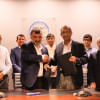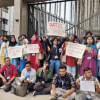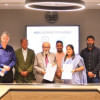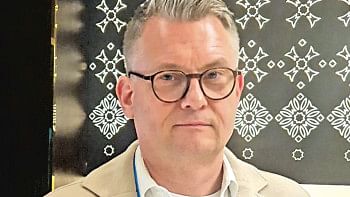BRAC University hosts seminar on transformative language policies

A seminar titled "Transformative Language Policies for Linguistic and Cultural Diversity, and Social Justice and Equity in Bangladesh" was recently organised at BRAC University by the BRAC Institute of Languages (BIL).
The event identified some possible and plausible strategies for formulating inclusive language policies that uphold the rights of all linguistic communities, ensure respect for diversity, and encourage active participation in language maintenance across the nation.
It also sought to motivate students to appreciate different languages and cultures in Bangladesh and beyond.
Professor Salimullah Khan, Director of the Center for Advanced Theory and Professor of General Education Program at the University of Liberal Arts Bangladesh, and Monsur Musa, Professor of Language and Linguistics at Gono Bishwabidyalay, presented papers in the seminar.
The duo emphasised the need for transformative approaches to language policies and practices that recognise and protect the rich linguistic and cultural diversity in Bangladesh.
Professor Khan explored why the postcolonial bourgeoisie often prefers English, pointing out that this choice reflects a lingering colonial mindset – an internalised belief in the superiority of the coloniser's language and culture.
He emphasised that true freedom lies in disalienation – a conscious reclaiming of cultural identity as a step toward a more authentic and liberated existence.
Professor Musa traced the historical shifts in language policy from colonial Bengal to present-day Bangladesh.
He examined the enduring legacy of English through colonisation, independence, and globalisation, and argued that Bangladesh must now adopt a scientifically grounded and contextually relevant language policy.
Drawing on global examples of language policies, Professor Musa urged the formation of consultative bodies to guide future language planning that promotes national cohesion and linguistic maturity.
Professor Shaila Sultana, Director of the BIL, shared a concept note on linguistic rights, cultural preservation, and inclusive policy making. She discussed the necessity of decolonisation and the urgency of delinking from colonial thoughts.
Only with a critical understanding of colonialism, distance from colonial, capitalist, and patriarchal systems, sensitivity about the local knowledge, history and narrative, and a desire for an alternative decolonial reality can a transformative language policy be developed in Bangladesh, she said.
Afterwards, local and international students of BRAC University staged cultural performances in 10 different languages, celebrating multilingualism and the cultural mosaic in Bangladesh.

 For all latest news, follow The Daily Star's Google News channel.
For all latest news, follow The Daily Star's Google News channel. 








Comments